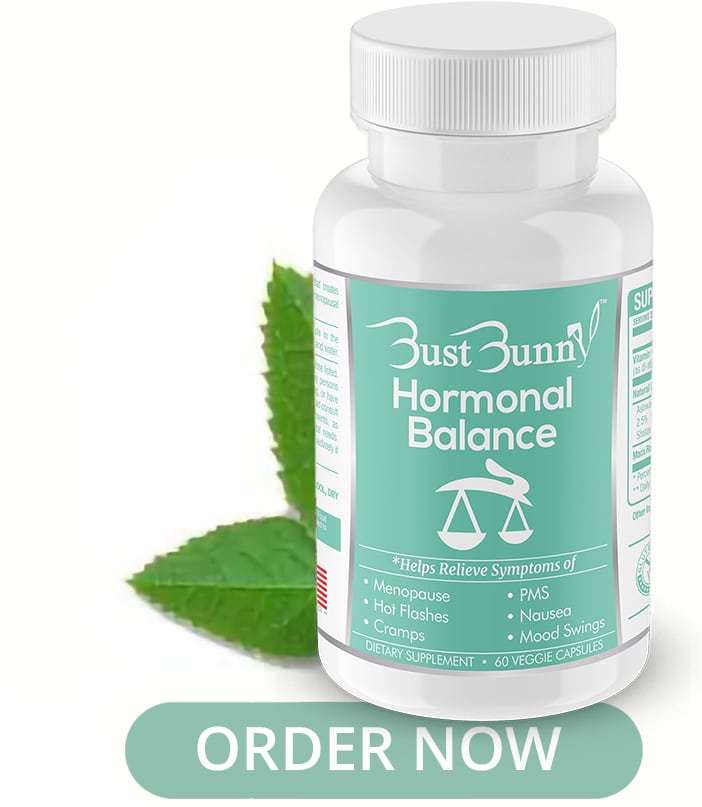Hair loss caused by hormonal imbalance is a tough battle to fight.
Many are clueless about how to tackle it. But understanding and addressing this problem separates those who suffer in silence from those who take charge of their health. However, if you don’t know how to manage your hormones effectively, you’ll never overcome this hurdle.
In this guide, you’ll learn:
- How hormonal imbalance affects the hair growth cycle
- Signs and symptoms of hormonal imbalance-related hair loss
- Natural remedies and supplements Like Bust Bunny for hair loss
The Hair Growth Cycle and Its Impact on Hair Loss
Let’s embark on a journey to understand the intricate process of hair growth.
This cycle comprises four distinct phases: growth, transition, resting, and returning growth. Each follicle undergoes this pattern over two to five years.
A Closer Look at The Phases
| Phases | Other terms | Description |
| Anagen | Growth Phase | This is when your hair actively grows from its follicles. |
| Catagen | Transition Phase | Here, the active growing phase ends as your hairs prepare for rest. According to studies, about 1% of all hairs are in this stage at any given time. |
| Telogen | Resting Phase | During this phase, the hair is still attached to the follicle, but it is not growing. |
| Exogen | Returning Growth or Shedding Phase | During this phase, the hair falls out and is replaced by new hair. |
The hair growth cycle is regulated by a number of hormones. These can affect the length of each phase of the hair growth cycle, and they can also cause hair loss.
Common Causes of Hair Loss in Women
Hair loss can be distressing for women.
Many contributing elements can cause this issue, from hormonal discrepancies due to circumstances such as perimenopause or PCOS (polycystic ovarian syndrome), stress, nutritional inadequacies, thyroid problems, and more.
Hormonal Imbalance
Hormones play an integral role in hair health.
An imbalance can lead to excessive hair fall or thinning. Conditions such as PCOS result in elevated levels of male hormones that disrupt the normal cycle leading to significant changes, including female pattern baldness.
Stress
We all know how damaging chronic stress is for our overall well-being. But did you realize it also impacts your locks?
Chronic stress triggers hormone imbalances causing havoc with your tresses.
Prolonged periods under duress may lead not only to physical symptoms like weight gain but could also cause brittle, dry hair. This eventually leads to abnormal patterns of hairs falling out.
Nutritional Deficiencies
What you eat can significantly affect your hair health. Studies have shown that deficiencies in certain nutrients can impact blood flow to the hair follicles. This lack of nourishment may lead to excessive hair loss.
The three most important nutrients are:
- Iron. An iron deficiency, for instance, is a common nutritional shortfall leading to thinning hair, particularly among women. Your body needs iron for many functions – one being supporting your scalp’s oil glands.
- Vitamin D. This nutrient plays an integral role in promoting healthy hair follicle growth.
- Vitamin B12. This aids with red cell production, which carries oxygen and nutrients needed by these very same follicles.
Incorporating such nutrient-dense foods into your meals could be just what you need. So before exploring other treatment options available against hormonal imbalances causing this unwarranted distress, a diet is better.
How Hormonal Imbalances Cause Male Pattern Baldness in Women
Hormonal imbalances can wreak havoc on your hair health. This leads to conditions like male pattern baldness, even in women. Hair loss related to hormonal imbalance is commonly connected with increased androgen levels because of certain medical problems such as PCOS or menopause.
The Role of Androgens in Hair Loss
Androgens is a group of sex hormones that include testosterone.
In normal circumstances, they play an essential role in regulating various body functions. This includes the growth cycle for your hair.
A study has shown, however, when there’s an imbalance causing excessive production – it could lead to shrinking hair follicles. This results in thinning strands over time, eventually culminating in what we know as female pattern hair loss or androgenetic alopecia.
Apart from irregular periods and weight gain, one common sign includes excess amounts of male hormones. It may result not just only on the scalp but also in unwanted facial hairs growing out excessively.
Natural Approaches to Combating Hair Loss
Experiencing hormonal hair loss can be distressing. But don’t worry. There are natural ways you can reverse this trend and promote healthy hair growth, such as:
1. Managing Stress Levels
The first step is managing your stress levels. Stress, as mentioned above, can trigger hormone imbalances leading to excessive hair fall.
Meditation or yoga could help in reducing chronic stress, thus promoting healthier locks.
2. Dietary Changes
A balanced diet rich in essential elements, including proteins (hair building blocks), omega 3 fatty acids (promotes shine), and zinc (cell regeneration), will help maintain good overall as well as specifically ‘hair’ health. Additionally, iron, vitamins D and B12 ensure good blood flow, stimulating the follicles to produce new hairs instead of shedding old ones excessively.
Incorporating foods like spinach, eggs, or lean meats does the trick.
3. Using Supplements Like Bust Bunny
Bust Bunny is a supplement designed specifically with women’s health in mind. It works by balancing hormones naturally, which helps maintain a healthy cycle of hair growth while minimizing the chances of excessive thinning or falling out.
4. Taking Proper Scalp Care
In addition to these methods, proper scalp care, including regular cleansing & moisturizing, also plays an integral role in maintaining the overall healthiness of your mane.
Thyroid Disorders And Their Effect On Hair Health
Your thyroid is a small but mighty gland that is situated in your neck. It’s responsible for producing hormones that regulate metabolism and other crucial bodily functions.
However, when this tiny powerhouse malfunctions due to conditions like hypothyroidism or hyperthyroidism, the effects can be far-reaching. This includes your hair health.
Hypothyroidism
It occurs when your body doesn’t produce enough thyroid hormones leading to slow metabolic processes – including those related to hair growth. This results in thinning hairs across the scalp, with some individuals even experiencing bald spots.
Luckily there are ways you can combat such hormonal imbalances-induced fallout. Regular check-ups help detect these disorders early. Additionally, dietary changes and medications restore hormone levels to normalcy, promoting healthier regrowth.
Hyperthyroidism
It’s different from hypo, where the thyroid gland produces too much thyroid hormone. Thyroid hormone is important for many bodily functions, including hair growth.
If you’re grappling with hyperthyroidism, where excess production leads to similar symptoms as its counterpart, fear not. Staying vigilant about maintaining optimal nutrition intake and managing stress levels effectively will aid in restoring lost luster.
What is Postpartum Hair Loss?
The joy of welcoming a new life often comes with an unexpected twist for many women – postpartum hair loss. This temporary but significant shedding, known as postpartum alopecia, can be quite alarming.
During pregnancy, increased estrogen levels keep your hair in the growth phase, leading to thicker locks. But after delivery, these hormone levels plummet back to normalcy, causing hairs that were growing to shift into the resting stage before falling out. Your body is simply readjusting itself post-pregnancy, which includes resetting its hormonal balance.
Ways to Avoid Excessive Hair Shedding After Childbirth
Here are ways you can avoid hair loss:
- Maintain a balanced diet rich in protein and iron for optimal hair health. This not only helps slow down excessive hair fall but also promotes healthy hair growth.
- Avoid tight hairstyles like ponytails or braids that may pull on already stressed follicles.
- Treat your tresses gently when washing or brushing, avoiding unnecessary stress.
It’s important, though, not to panic during this period. Remember, it’s just part of the journey toward becoming a mother. As you navigate this transition, know there are solutions available if things seem overwhelming.
The Importance of Regular Clinical Evaluation
Regular clinical evaluations are a crucial part of maintaining hair health. These check-ups can help detect any underlying causes contributing to abnormal patterns of hair fall.
Hormonal imbalances due to thyroid disorders or nutritional deficiencies like iron deficiency often go unnoticed until they manifest as excessive hair loss. Scheduling regular visits with your healthcare provider ensures early detection and treatment for these conditions.
Beyond that, doctors can also provide personalized advice on managing stress levels. This is another significant contributor to hormonal imbalance and subsequent hair thinning or bald spot formation.
In cases where male hormones lead to female pattern hair loss, a timely diagnosis could be the key to preventing further damage. This restores hormonal balance through treatments such as hormone therapy or natural supplements like Bust Bunny.
Apart from addressing physical aspects related to your body’s hormone levels, it’s equally important not to overlook mental well-being too.
FAQs About Hormonal Imbalance Causing Hair Loss
Can hormone imbalances cause hair loss?
Hormones play an important role in regulating the hair cycle. When there is an imbalance in hormones, it can cause the growth cycle to be disrupted, which can lead to hair loss.
Can hair loss be treated?
Hair loss caused by hormonal imbalance can be reversed in some cases. However, the success of treatment depends on the underlying cause of the hormone imbalance and the severity of the hair loss.
What hormonal disorders cause hair loss?
There are a number of hormonal disorders that can cause hair loss. These include:
- Stress
- Medications
- Nutritional deficiencies
- Medical conditions
- Genetics
How do you balance hormones for thinning hair?
Balancing hormones for thinning hair involves addressing the underlying hormonal imbalances that may be contributing to hair loss. Here are some strategies that can help:
- Consult a healthcare professional
- Hormone Replacement Therapy (HRT)
- Manage stress
- Balanced diet
- Avoid crash diet
- Medications and natural supplements like Bust Bunny
- Avoid harsh hair treatments
Conclusion
Understanding the hair growth cycle and how disruptions can lead to bald spots is your first step toward combating this problem. Women, too, may suffer from male pattern baldness due to hormonal changes caused by certain conditions. But there’s hope!
Natural approaches such as stress management techniques, balanced dieting, supplements like Bust Bunny for hormone regulation, and good scalp care practices could help keep those tresses intact.
Above all, knowledge is power when dealing with issues like hormonal imbalance related to hair loss!


